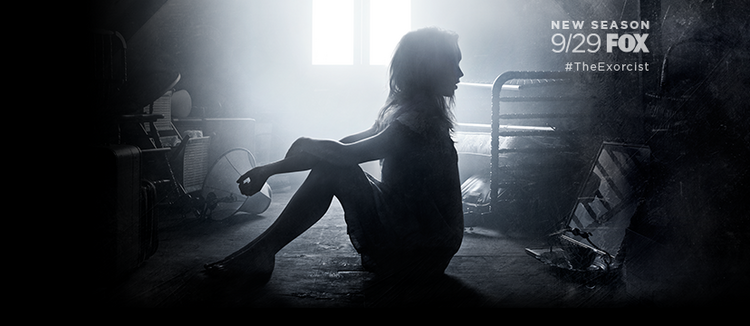To the two books and five movies in “The Exorcist” franchise, the last released in 2005, we must add Fox’s new show, whose second season will premiere on Sept. 29. Is it just another profit-seeking franchise in this revival-happy era? Or does the series speak to some appetite particular to our own time?
Well, it’s a little bit of both, as it turns out.
The protagonists of the television show are obvious reworkings of the original characters, Fathers Karras and Dyer, as written by the author and screenwriter William Peter Blatty in the original novel (1971) and first film (1973). In Fox’s rendition, Father Tomas (Alfonso Herrera) is young, Mexican and conventionally progressive; Father Marcus (Ben Daniels) is old, Irish and conventionally reactionary. Casey (Hannah Kasulka), the victim, is predictably young and pretty. (Why do cinematic demons have such a strong preference for naïve white women?) The show’s antagonist is the demon spirit Pazuzu, who features in every “Exorcist” retelling, this time recast in human form as the “The Salesman” (Robert Emmet Lunney).
One of the persistent, unspoken questions about “The Exorcist” franchise is why Pazuzu is fixated on this particular set of characters rather than seeking more varied fare, and the answer, as usual, is that the writers need to put franchise loyalists in front of a screen. The series adds nothing of interpretive worth to the prior installments, but it does put eyeballs in front of TVs.
Yet this certainly is an “Exorcist” for our times. There are superficial nods to the perceived state of contemporary ecclesiastical politics—Father Tomas, the Latin American “modern,” and Father Marcus, the old world “conservative,” eventually team up against a hopelessly corrupt and feckless hierarchy (represented by, among others, the provocatively named Bishop Egan). The special effects are exciting and expensive-looking (though kind of silly, even by pea-soup-as-vomit standards). Pazuzu’s new moniker seems tailored for an audience skeptical of capitalism.
Perhaps what makes this “Exorcist” so current is its embrace of absurdly high-stakes situations. As Father Marcus, T-shirted and holding a gun, screams “You’re trying to kill the pope!” one can’t help but wonder whether the plot was written with Bruce Willis in mind. (Maybe this season we’ll find out Pazuzu was behind the Kennedy assassinations.)
This 21st-century sensationalism overlooks what made the original book and film so horrifying. The 1973 “Exorcist” was deliberately unsensational, and that’s why it was a sleep-robber; evil exists and can strike not only presidents and religious leaders but ordinary people in the midst of the mundane. How many people in that first 1973 audience had considered the Ouija board a harmless parlor game sitting in their hall closets? Obscurity guarantees no safety from evil.
Particular details underline that the writers of Fox’s “Exorcist” have missed the point of possession stories, in more ways than one. The same could never be said for the devout and erudite William Peter Blatty. In Fox’s “Exorcist,” the most fanciful departure from the original is the idea of “integration,” whereby the possessing demon can annihilate the soul of the possessed and take full control of his or her body. This departure endangers this entire subgenre of horror. The terror of the possession story does not arise from empathy for the physical peril of bystanders, but from empathy for the possessed who live powerlessly under the domination of a tormenting spirit. Once the possessed soul ceases to exist, his or her body becomes a more or less conventionally frightening zombie rather than the object of a special horror.
Evil—supernatural evil—is real, and art or entertainment that acknowledges this has an important role to play in this godless age. But Fox’s oddly contemporary “Exorcist” fails because it is unable to transcend materialism: The upshot of everything is politics, and the worst things that can happen are fundamentally material.











Despite its deficiencies when compared to the movie, I do generally enjoy The Excorcist as a television program. Regarding the superb movie, I readily identified with Father Karras, who not only had serious doubts about the rite of excorcisn (seeing the girl's problem as being psychological rather than the spiritual matter of possession) but who doubted the Real Presence of Christ in the Eucharist. Like this priest in the film, for some time I also doubted God's existence, though like him I tried my best to live my life as a good Catholic. Not to be presumptuous, but like all followers of Jesus, I commit my share of sins (probably more than the "average" Catholic). But for some time I have found consolation by going to the Sacrament of Reconciliation about once a month with a compassionate priest.
I agree that the film lacks spiritual depth, and that is a serious shortcoming. It also contains concepts quite alien from Catholic thought but in tune with contemporary progressive thought. Witness the mother superior of a contemplative abbey that specializes in exorcisms. She wants to have mercy on the possessed young woman by administering a fatal dose of a potion made from a poisonous plant, which Cadfael and Miss Marple popularized, before she is integrated and damned forever. It even works in a sex scene, which is absolutely mandatory for made-for-streaming TV.
Yet for all that I still enjoyed it and found it thought provoking. The serial production allows the show to explore the experience more deeply from many different points of view. Most interesting are the family dynamics between sisters, father and daughters, the mother and the grandmother. The questions raised by the diocesan hierarchy and the wealthy elite are actually more than plain old earthly earthly greed and conspiracy. There’s a frightening connection with the demonic possession. The year’s conclusion reveals the depths to which the mother goes to release her daughter from the grip of the demon and is a great cliffhanger.
And Finally, no priestly pedophiles. Yet.